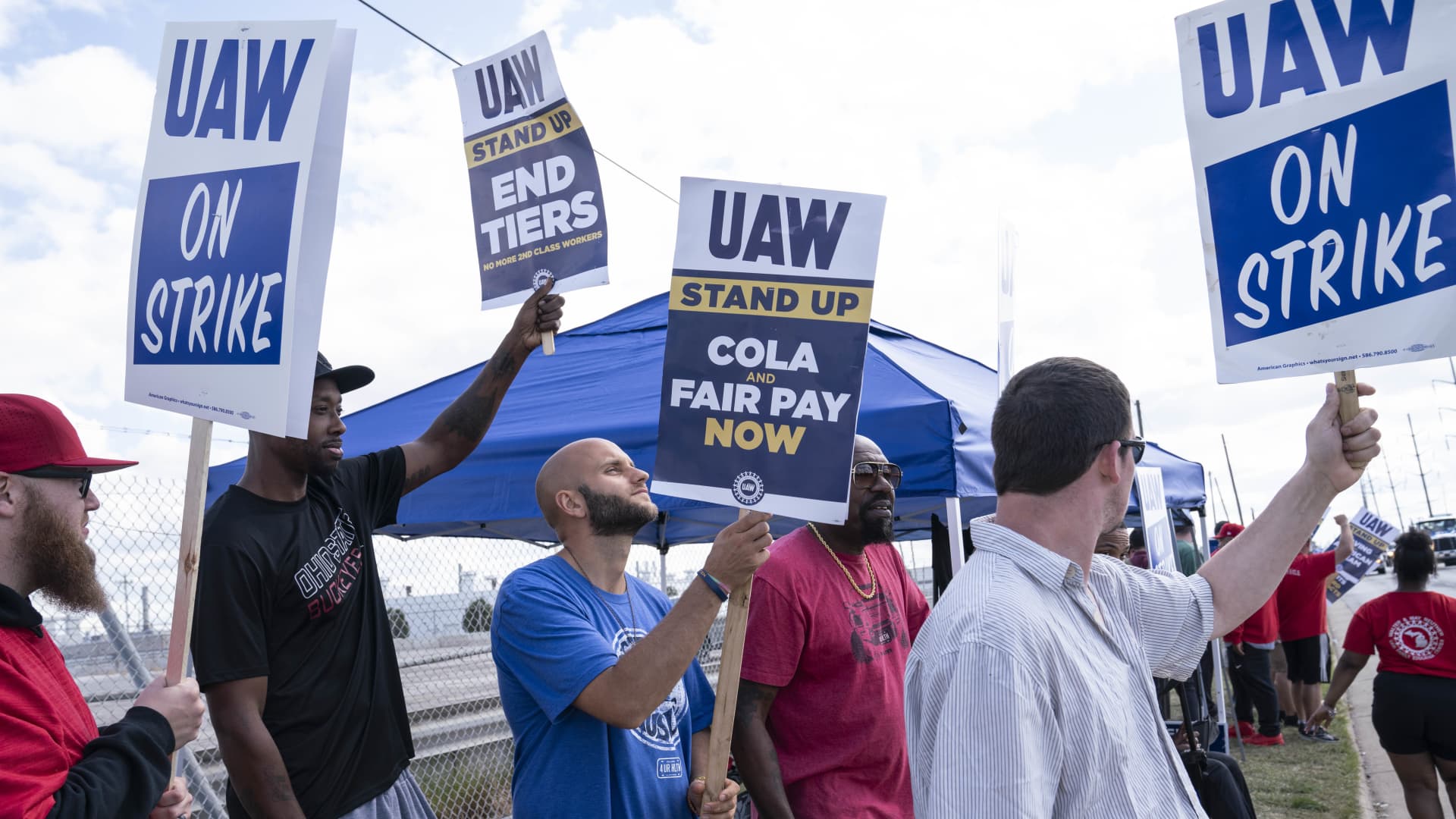Supporter Ryan Sullivan and members of the United Auto Workers, including Chris Sanders-Stone, Casey Miner, Kennedy R. Barbee Sr., and Stephen Brown, gather outside the Toledo, Ohio Jeep Plant on September 18, 2023. Their presence is captured in an image by Sarah Rice of Getty Images.
As the deadline for expanded strikes by the United Auto Workers against Detroit automakers looms, achieving the “serious progress” demanded by the union seems increasingly elusive. Both the UAW and General Motors, Ford Motor, and Stellantis remain firm in their demands, making it likely that the union will strike more plants at noon on Friday, as previously warned. Despite ongoing talks, little movement has been reported in proposals since the strikes began on September 15 in Michigan, Ohio, and Missouri. Sources familiar with the negotiations describe a significant gap in demands, with the parties remaining far apart.
Key economic issues and benefits, such as hourly pay, retirement benefits, cost-of-living adjustments, wage progression, and work-life balance, continue to be central topics of discussion. Each automaker has its own unique concerns, but the overarching goal is to avoid fixed costs and what the companies deem “uncompetitive practices,” such as traditional pensions. On the other hand, the union aims to regain lost benefits from previous negotiations and secure substantial increases in pay and other benefits while maintaining platinum healthcare for its members.
In the end, the central concern revolves around money and the cost of a potential deal for the companies. Wall Street expects the settlement to result in record costs, though still falling short of the $6 billion to $8 billion demanded by the union, according to analysis by Wells Fargo.
Here is a general overview of the current positions of the union and companies on key issues:
Wages:
Union leaders have been transparent in their demands for wage increases of 40% over four and a half years. While there have been reports of some adjustment to this demand, bringing it to the mid-30% range, UAW President Shawn Fain stated last week that the union has not offered anything below 30%. In response, the automakers have proposed wage increases of around 20% over the contract’s duration, with a majority of workers reaching a top wage of over $39 per hour.
Tiers/’In-progression’/Temps:
The issue of wage tiers, which categorize workers into different pay ranges or classifications, remains a complex and shifting topic. The automakers and union have defined tiers differently in past negotiations and continue to do so in the current talks. The concept of tiers encompasses pay discrepancies, differences in job responsibilities, and distinctions between assembly and components plant workers, depending on the context. The UAW advocates for equal pay for equal work, while automakers argue for pay based on seniority, job classification, and responsibilities. Tiers were initially introduced in 2007 as a concession by the union, allowing lower wages and benefits for workers hired after the ratified contracts, commonly known as a second tier. While some similar benefits have been restored for newer workers, disparities in worker classifications and pay tiers persist. The union seeks to eliminate the in-progression pay structure altogether and ensure consistent wages across the contract, including for temporary workers.
COLA/Profit-sharing:
Cost-of-living adjustments (COLA) were suspended by the UAW in 2009 as part of cost-cutting measures. The union now aims to reinstate COLA, particularly given recent high inflation rates. The automakers have proposed lump-sum payments or inflation-based calculations that the union believes would be insufficient to offset increased costs. Automakers argue that profit-sharing payments, traditionally based on North American profits, have helped mitigate inflationary effects. As the automakers seek to address rising costs, they also propose changes to profit-sharing payments, which the union hopes to enhance.
32-hour workweek:
Expanding work-life balance options, the UAW proposes a potential 32-hour workweek for the pay equivalent of 40 hours. The union highlights that salaried workers benefit from remote or hybrid work, allowing them more time with their families at home. While the automakers reject the idea of a shorter workweek, they counter with additional vacation time, increased holiday pay (e.g., for Juneteenth), and two-week paternal leave in some cases.
Product:
Product commitments from automakers translate to job security for the UAW. The UAW is particularly concerned with Stellantis’ plans, which include closing, selling, or consolidating 18 facilities. These locations encompass North American headquarters, 10 parts and distribution centers, and three manufacturing component facilities. On the other hand, sources indicate that GM has committed to product plans for all of its facilities, following three closures four years ago.
Retirement benefits and savings:
The UAW seeks a significant increase in pay for retired workers, but the companies have rejected such proposals. However, GM CEO Mary Barra mentioned that the company’s offer includes a lump-sum cash payment of $500 for retirees. Ford’s current offer includes a health-care retirement bonus program with varying lump sums of $50,000 or $35,000 upon retirement, based on seniority, for newer workers. Automakers resist a return to traditional pensions and favor 401(k) plans instead. Ford’s proposal includes a 6.4% company contribution, with a cap removed, alongside a $1 per hour addition for every hour worked.
The negotiations reveal the deep divisions between the UAW and automakers in their demands and priorities. As the deadline approaches, the potential for additional strikes and continued standoffs between the parties intensifies.
Denial of responsibility! Vigour Times is an automatic aggregator of Global media. In each content, the hyperlink to the primary source is specified. All trademarks belong to their rightful owners, and all materials to their authors. For any complaint, please reach us at – [email protected]. We will take necessary action within 24 hours.


